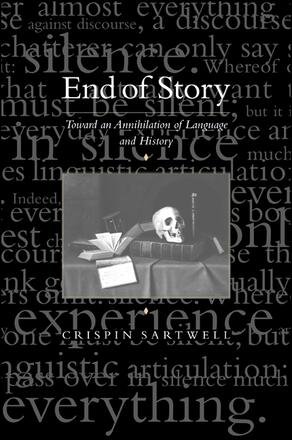
End of Story
Toward an Annihilation of Language and History
Alternative formats available from:
Argues that the academy's obsession with language, and in particular with narrative, has become a sort of disease.
Description
In End of Story, Crispin Sartwell maintains that the academy is obsessed with language, and with narrative in particular. Narrative has been held to constitute or explain time, action, value, history, and human identity. Sartwell argues that this obsession with language and narrative has become a sort of disease. Pitting such thinkers as Kierkegaard, Bataille, and Epictetus against the narrativism of MacIntyre, Ricoeur, and Aristotle, Sartwell celebrates the ways narratives and selves disintegrate and recommends a lapse into ecstatic or mundane incoherence. As the book rollicks through Wodehouse, Thoreau, the Book of Job, still-life painting, and Sartwell's autobiography, there emerges a hopeful if bizarre new sense of who we are and what we can be.
Crispin Sartwell is Chair of Humanities and Sciences at Maryland Institute, College of Art. He is the author of several books, including The Art of Living: Aesthetics of the Ordinary in World Spiritual Traditions and Obscenity, Anarchy, Reality, also published by SUNY Press.
Reviews
"Engaging, passionate, and above all quirky, this brief contribution to the field of philosophy of language fuses the personal (even autobiographical) and the conceptual (e. g., cyclical time) … His focus on both teleology and postmodernism is particularly muscular and convincing. The discussions of time, action, value, history, and human identity, especially in the context of relevant thinkers like Ricoeur and Bataille, lead the reader into uncharted and always interesting territory … the author's forays into other fields result in some priceless observations … Recommended for research libraries. " — CHOICE
"End of Story is brilliant, quirky, original, passionate, and above all, different. It situates itself as an attack on some trends in contemporary thought, and reaches back to their earlier formation in the Western tradition: above all, the idea of life as project and a meaningful life as one out of which a successful quest narrative can be constructed; and it offers an alternative vision, not as a replacement, but as a complement—the vision of silence, as Sartwell calls it. In short, this is the book of someone who really thinks—a piece of real originality, not for the fainthearted, the staid, the conformist, or those intolerant of idiosyncrasy. " — Gary Saul Morson, author of Narrative and Freedom: The Shadows of Time
"Wonderfully engaging; Sartwell succeeds in bringing together the personal with what is more generally considered philosophical, without sacrificing either. The arguments make sense and the examples are compelling; in a work largely concerned with narrative, the graceful use of stories is especially notable. The success of the intersection of personal with philosophical is demonstrated when one comes away liking the author along with his book, thinking that for someone who avoids people he would nonetheless make a marvelous dinner companion. " — Karmen MacKendrick, author of Counterpleasures
"I think that the book is useful as a kind of self-help book for academics suffering from overwork and general anxiety!" — Alison Leigh Brown, author of Subjects of Deceit: A Phenomenology of Lying